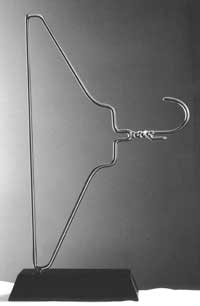 Talk about the application of the chaos theory in Nepal's attempts at pursuing international trade! Eighteen Tibetans are deported and a few days later, a writer in San Francisco-citing ethical reasons-advises travellers to boycott Nepal through a newspaper op-ed and a website. Within a week, an American Senator, feeling the heat from her pro-Tibet constituency, withdraws a Nepal-friendly garment bill from being tabled in the US Congress, leaving Nepal's private sector frustrated and helpless.
Talk about the application of the chaos theory in Nepal's attempts at pursuing international trade! Eighteen Tibetans are deported and a few days later, a writer in San Francisco-citing ethical reasons-advises travellers to boycott Nepal through a newspaper op-ed and a website. Within a week, an American Senator, feeling the heat from her pro-Tibet constituency, withdraws a Nepal-friendly garment bill from being tabled in the US Congress, leaving Nepal's private sector frustrated and helpless. Looking back, who could have predicted that the window of relief worth millions of rupees that was potentially ours would be shut because of 18 Tibetans who were sent back? Who could have known how such remotely linked activities would effect one another and cause so much distress and angst in Nepal's business sector?
Now that such an unlikely confluence of activities-or, as chaos theorists would say, a series of non-linear events that, upon hindsight, somehow ended up being connected to one another-has taken place, we must ask ourselves what we can learn from this experience. We must devise strategies to assist Nepali private sector businesses through similarly unpredictable paths of international trade in the coming years. Obviously, mere appeals to the better nature of international buyers will get us nowhere. Neither will indulging in ad hoc damage-control mechanisms by dashing off ill-thought-out letters of apologies. We need to take a longterm view and work hard to have a framework in practice so that Nepal is ready to respond effectively to events that relate directly to our commercial interests as they unfold internationally.
One tool we have talked much about in the past but have not made much use of is that of economic diplomacy-the kind that opens doors in other countries for Nepal to sell her goods and services with ease. As it happens, exactly a year ago, Kathmandu-based Institute of Foreign Affairs (IFA), after months of interviews with former ambassadors and key private sector players and additional research by the Policy Study Group, submitted a report titled Nepal's Economic Diplomacy to the then government.
Pointing out that "foreign aid is not likely to continue as the most attractive component of economic diplomacy [because of] declining overseas development assistance [in the form of outright grants]," the report suggested that the Ministry of Foreign Affairs (MFA) transforms itself to play the role of a facilitator to help the Nepali private sector take advantage of global opportunities in "trade, tourism and employment generation". The report further detailed how the institutional mechanism at the MFA could be re-arranged to help adjust the MFA to its new role as a catalyst for private sector players looking to trade internationally. A year later, we are back to responding to international situations, as our government did in this case of the garment bill, in an ad hoc manner with "embarrassing results", while the IFA report, with its detailed recommendations, sits on a shelf, collecting dust.
To be sure, there is no guarantee that economic diplomacy alone would have somehow saved the garment bill.
oubtless, there were other factors such as the hurdle of getting the bill past the powerful Senate Finance Committee, which is not known for doling out concessions to Third World traders. Still, it is arguable that had we the mechanism of economic diplomacy in place, we could have smoothed ruffled feathers, tried to understand other perspectives, changed our sales pitch, garnered a measure of sympathy and, even in failure, left the door slightly ajar for future bilateral negotiations.
And so, the tragedy of the failure of the garment bill is not that Nepal did not get what it wanted. It lies in the fact that even when seemingly unrelated phenomena converged to give us a serious blow, we have yet to process the lessons to urgently push for economic diplomacy when dealing with other countries.



